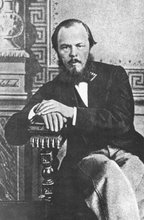 Dostoevsky in Omsk placed his bet on faith. Unlike Primo Levi, he was not tortured by the specter of dying as a fraud. Rather, in prison he exercised his curiosity about faith, befriending an Arab and asking for a copy of the Koran to read (the very fact of his asking for a book shows how differently he experienced prison in Omsk, as compared to Levi's dehumanizing time in Auschwitz). However, it is my contention that he did not fully engage in his faith until much later, in the Swiss boarding house where his cries of grief upon the death of his firstborn child annoyed the purse-lipped neighbors. Dostoevsky's faith conversion in Omsk was that "opportunistic" one described by Levi. Throughout his life, this decision to move towards God became more of a natural habit, however, it remained a lottery to him for a very long time. Gambling was his god until the roulette tables of Germany were closed: a perfect metaphor for a man who is madly aspin, with his money on red, then black, almost never succeeding at making that wheel stop in a position advantageous to himself, not content until he has ruined himself over and over again. His relationship with god, as we understand from the Karamazov Brothers, is much like his relationship to the wheel of chance.
Dostoevsky in Omsk placed his bet on faith. Unlike Primo Levi, he was not tortured by the specter of dying as a fraud. Rather, in prison he exercised his curiosity about faith, befriending an Arab and asking for a copy of the Koran to read (the very fact of his asking for a book shows how differently he experienced prison in Omsk, as compared to Levi's dehumanizing time in Auschwitz). However, it is my contention that he did not fully engage in his faith until much later, in the Swiss boarding house where his cries of grief upon the death of his firstborn child annoyed the purse-lipped neighbors. Dostoevsky's faith conversion in Omsk was that "opportunistic" one described by Levi. Throughout his life, this decision to move towards God became more of a natural habit, however, it remained a lottery to him for a very long time. Gambling was his god until the roulette tables of Germany were closed: a perfect metaphor for a man who is madly aspin, with his money on red, then black, almost never succeeding at making that wheel stop in a position advantageous to himself, not content until he has ruined himself over and over again. His relationship with god, as we understand from the Karamazov Brothers, is much like his relationship to the wheel of chance.After reading Levi about forced conversions in Auschwitz, Smerdyakov's argument about a forced conversion comes vividly to mind. He describes a believer captured by infidels and tormented to renounce Christ: "But if precisely at that moment I tried all that, and deliberately cried to the mountain: "crush my tormentors" -- and it didn't crush them, then how, tell me, should I not doubt then, in such a terrible hour of great mortal fear? I'd know even without that that I wasn't going to reach the fullness of the Kingdom of Heaven . . . so why, on top of that, should I let myself be flayed to no purpose?" This Christian's prayer is to chance, and the house wins. This is how Dostoevsky bargains with god, until he loses a child. To see a little child suffer, that is to know faith. It is a true faith that wants to save not oneself, but another. We see Alyosha's superior faith when he is out-of-the-blue pelted with stones by a little child, and wonders, "what did I do?" and, recognizing that those stones have flown directly, like heavenly arrows, from the source of the child's suffering, "what can I do?"
Photo credit: 19th European roulette wheel from a Creede, Colorado historic museum-saloon once operated by Jesse James' assassin. Original source off-line.
